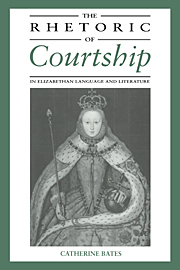Book contents
- Frontmatter
- Contents
- List of illustrations
- Acknowledgements
- Prologue
- 1 The rhetoric of courtship: an introduction
- 2 The semantics of courtship
- 3 Courtship at court: some pageants and entertainments at the court of Elizabeth I
- 4 ‘Courtly courtesies’: ambivalent courtships in Euphues, Euphues and his England, and the Arcadia
- 5 ‘Of Court it seemes, men Courtesie doe call’: the Amoretti, Epithalamion, and The Faerie Queene, book vi
- Epilogue
- Notes
- Bibliography
- Index
4 - ‘Courtly courtesies’: ambivalent courtships in Euphues, Euphues and his England, and the Arcadia
Published online by Cambridge University Press: 29 September 2009
- Frontmatter
- Contents
- List of illustrations
- Acknowledgements
- Prologue
- 1 The rhetoric of courtship: an introduction
- 2 The semantics of courtship
- 3 Courtship at court: some pageants and entertainments at the court of Elizabeth I
- 4 ‘Courtly courtesies’: ambivalent courtships in Euphues, Euphues and his England, and the Arcadia
- 5 ‘Of Court it seemes, men Courtesie doe call’: the Amoretti, Epithalamion, and The Faerie Queene, book vi
- Epilogue
- Notes
- Bibliography
- Index
Summary
Endimion's love for Cynthia – flattering yet desexualized, amorous yet not appropriative – compounds all the paradoxes of courtship at court, and sketches the complex and convoluted relations that existed between members of the court of Elizabeth I. What both the Queen and her courtiers exploited was the sexual indeterminacy of the courtship-situation. Courtiers were permitted to love without loving, and to desire without desiring; the Queen, to be flattered without in any way diminishing her fame or her majesty. At the court of Elizabeth, then, courtship was frequently separated off from its nuptial function and became an end in itself, a convenient way of expressing political loyalty and devotion in desexualized and depersonalized terms. As a form of ritualized love-lore, courtship at court resisted the laws and codes of marriage, and allowed the partners an illusion of temporary liberty, the freedom to explore their sexual roles.
In his great speech on love at the end of Il Cortegiano, Pietro Bembo advises his courtly audience on the kinds of amorous behaviour that were permitted at the court: a courtly lady is allowed to grant her lover ‘mery countenances, familiar and secret talke, jeasting, dalying, hand in hand, [and] may also lawfully and without blame come to kissing’ (all gestures which, as Thomas Whythorne wrote, ‘some do call courting’). Bembo makes a crucial distinction between ‘l'amor razionale’ and ‘l'amor sensuale’, insisting that the latter is mere lechery and has no place in the civilized milieu of the ideal court, while rational love represents the highest passion that human beings are capable of, and is therefore to be cultivated by all educated and sensitive courtiers, male and female alike.
- Type
- Chapter
- Information
- Publisher: Cambridge University PressPrint publication year: 1992



